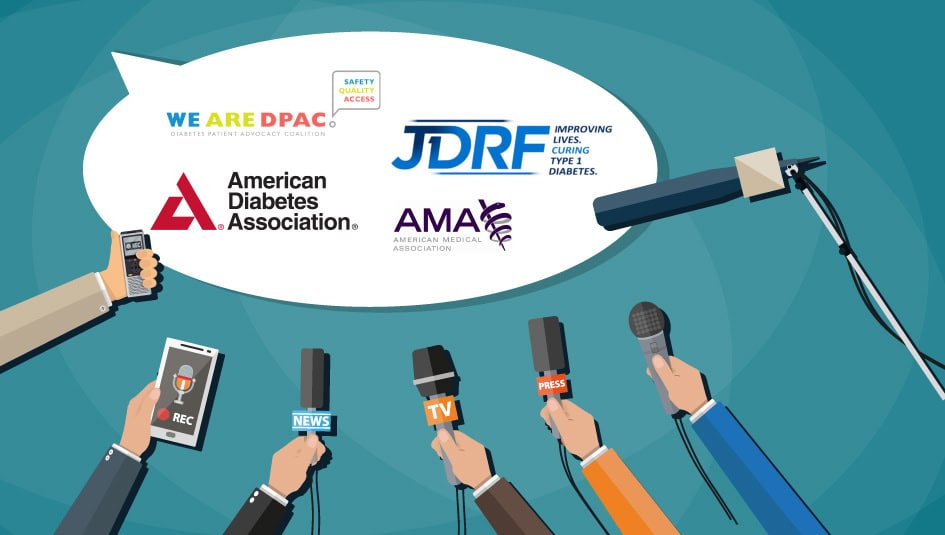What JDRF, ADA, DPAC Say About the Senate Health Bill

The Senate released a draft of its proposed legislation to repeal and replace the Affordable Care Act (“The Better Care Reconciliation Act of 2017”). Both this bill and the the House of Representatives-backed American Health Care Act (AHCA) have the potential to reshape how people with diabetes receive and pay for health care.
(You can read Insulin Nation’s initial analysis of the potential impact of the Senate bill on people with diabetes here.)
In the 24 hours after the release of the Senate bill, many major patient advocacy groups and medical societies have weighed in on the legislation. Here is a run-down of the latest statements by three diabetes advocacy groups, as well as an interview with the American Medical Association about the bill.
JDRF is keeping an eye on things
This statement was posted on JDRF’s Advocacy Facebook page in the late afternoon of June 22nd:
As you know, since earlier this year, JDRF has organized volunteers across the country to advocate for healthcare principles on behalf of people with T1D. JDRF expressed significant concerns about the health care reform bill passed by the House of Representatives and continued to advocate to the Senate for our principles.
JDRF is reviewing the Senate health bill now. It seems to keep current protections in place for those with pre-existing conditions, an important part of our health principles. We are concerned regarding possible coverage impacts, and we continue to evaluate. Please remember the bill is in draft form and it may be modified. www.jdrf.org/get-involved/jdrf-advocacy/healthcare-reform/
The American Diabetes Association gives the bill a hard “no”
The American Diabetes Association posted this statement on its Facebook page in the early evening on June 22nd:
Today, the Senate released their proposed health care legislation and it would significantly limit access to care for people with diabetes, who need comprehensive health coverage to effectively manage their disease. Tell your senators to vote NO on this bill and protect access to affordable and adequate care for all Americans.
The Diabetes Patient Advocacy Coalition (DPAC) calls for advocacy against the bill
DPAC released this statement in the late the morning of June 23rd. It notes that JDRF denounced the legislation, although Insulin Nation has not yet seen such a statement from JDRF. JDRF did denounce the House version of this bill, which has many similarities to the Senate bill.
As the patient voice for 29.1 million American families impacted by diabetes, the Diabetes Patient Advocacy Coalition (DPAC) strongly opposes the Senate’s healthcare bill, the Better Care Reconciliation Act. We stand with many other organizations, including the American College of Physicians, the American Academy of Pediatrics, American Heart Association, American Diabetes Association, and JDRF, denouncing this bill.
Written in secret, without bipartisan or medical advocacy organizations’ input, the bill will cut $834 billion to Medicaid over the next 10 years, eliminate cost-sharing subsidies by 2020 to help low-income families afford healthcare insurance, and permit states to cut essential health benefits and charge more for plans to those with pre-existing conditions. It also repeals funding for preventative and public health measures, which have helped diagnose and educate Americans with, or at risk of developing, diabetes. All of these will directly impact the diabetes community and will have devastating consequences for our nation as a whole.
We urge the diabetes community to contact their Senators through the DPAC mobile app or at www.diabetespac.org and ask them to vote no on this reconciliation bill, focusing instead on improving the existing laws governing our country’s healthcare system.
American Medical Association president condemns the bill’s proposal to curtail Medicaid coverage
David Barbe, president of the American Medical Association, was interviewed about the bill on NPR’s Morning Edition. His objections focused on passages of the bill which reduced the number of people covered under Medicaid and the amount of funding provided for Medicaid over time.
The following paragraphs are excerpted passages from that interview:
It is not (a bill we can support). This does all of the things that the AHCA did and will reduce coverage for individuals and will gut Medicaid.
…(We) came out very clearly opposed to caps on Medicaid funding. We think that the current system in which funding can vary based on the needs of a given state is a much better program than to (impose) arbitrary caps or block grants.
…There are not really many parts of this (bill) that we like. If we go down the list of things: Does it improve coverage? No. Does it improve affordability? No. Does it stabilize the safety net, Medicaid? No.
The only thing, maybe, it does is for two years it does replace the cost-sharing payments that insurance companies get. We are very concerned about insurance companies dropping out of the exchange market. Stabilizing that, even for a couple of years should help. So maybe that’s a tiny, silver lining, but that does not offset the other cuts that are really going to be bad.
Thanks for reading this Insulin Nation article. Want more Type 1 news? Subscribe here.
Have Type 2 diabetes or know someone who does? Try Type 2 Nation, our sister publication.